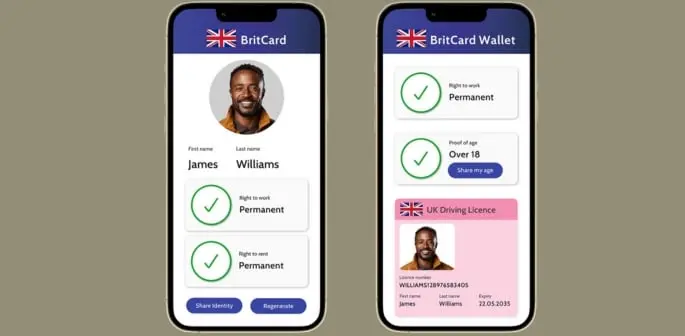Digital ID Shock: UK ‘Britcard’ Plan Could Become the World’s Biggest Hacking Target
Share

The UK government has announced plans to roll out a mandatory digital ID scheme, nicknamed “Britcard,” by 2029. The proposal would require citizens to store critical personal data — such as photos, birthdates, and residency details — directly on their smartphones.
While officials argue the move will streamline identity verification, reduce fraud, and modernize public services, cybersecurity experts are raising red flags. Critics warn that the plan could create an “enormous hacking target,” exposing millions of UK citizens to identity theft, surveillance risks, and potential government overreach.
This article explores what the Britcard is, why it matters, global comparisons, and what it means for everyday privacy.
What Is the “Britcard”?
The Britcard is the UK’s proposed national digital identity system, part of a broader push toward digitizing government services. Unlike physical ID cards, the Britcard would exist primarily as a smartphone-based app, containing verified citizen details.
Planned features include:
- Biometric data (photo, possibly facial recognition)
- Personal identifiers (full name, birthdate, residency status)
- Integration with government services (tax filings, healthcare, social benefits)
- Smartphone storage for everyday authentication
Why Experts Are Concerned
While digital IDs promise convenience, centralizing so much personal data raises serious risks:
- Hacking Target – A single breach could expose millions of citizens’ identities.
- Mass Surveillance – Critics fear the system could evolve into a government tracking tool, reducing civil liberties.
- Exclusion Risk – Vulnerable groups without smartphones may face barriers accessing services.
- Vendor & Third-Party Risks – If private contractors manage parts of the system, accountability becomes murky.
How Does the UK Plan Compare Globally?
The UK is not alone in pursuing digital IDs. Lessons can be drawn from other countries:
- India’s Aadhaar – The world’s largest biometric ID system, but plagued with data leaks and privacy lawsuits.
- Estonia’s e-ID – Often cited as a success story, combining convenience with strong encryption and transparency laws.
- Nigeria’s NIN – Centralized national ID project facing challenges around data protection and cyberattacks.
- EU Digital Identity Wallet – A more privacy-focused, decentralized approach aligned with GDPR principles.
The key difference is whether a system is designed with privacy by design or convenience first.
Legal and Privacy Implications in the UK
Under the UK GDPR and Data Protection Act 2018, storing such sensitive information comes with strict obligations:
- Data must be processed with clear purpose limitation.
- Users must retain consent and control over their information.
- Government must ensure robust encryption and security protocols.
If the Britcard project fails to meet these standards, it could face ICO investigations, public backlash, and even legal challenges.
What This Means for UK Citizens
If implemented, the Britcard will change how people prove identity, access services, and interact online. But citizens must weigh convenience against risks.
Key questions for individuals:
- Who controls your data — you or the government?
- How secure will the system really be against hackers?
- What rights will you have to delete, restrict, or audit your information?
- What happens if your digital ID is stolen or cloned?
How Citizens Can Stay Protected
Until more details emerge, experts recommend UK citizens:
- Stay updated on consultations and policy announcements.
- Advocate for privacy-by-design principles (encryption, decentralization, opt-out options).
- Use multi-factor authentication for sensitive accounts beyond Britcard.
- Pressure policymakers for transparency and independent oversight.
The UK’s Britcard digital ID plan could reshape identity management, but it also risks creating one of the biggest hacking targets in history if not properly secured.
For citizens, the choice is clear: demand transparency, accountability, and privacy safeguards now, before the system is rolled out. Otherwise, convenience today may lead to surveillance and insecurity tomorrow.




































Leave a Reply